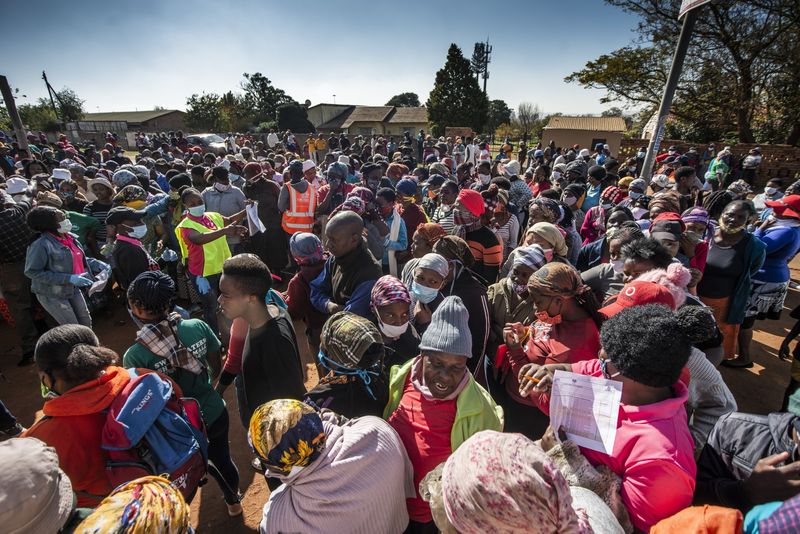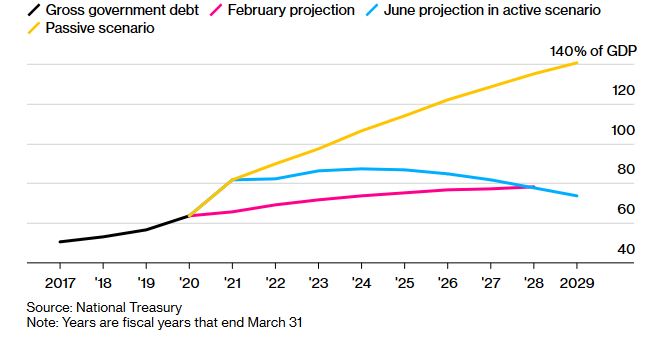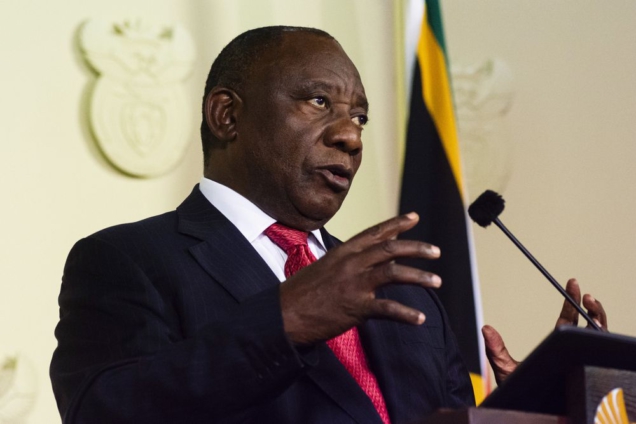A fight over graft within South Africa’s monolithic ruling party is intensifying, and its outcome could determine whether the continent’s most developed nation prospers or fails.
South Africa has labored for the past decade with a level of corruption that’s progressively slowed growth, bankrupted state companies and hollowed out institutions.
As party members take to the streets to protest against graft and public outrage grows, President Cyril Ramaphosa is accelerating his anti-corruption campaign in the governing African National Congress.
With an economy crushed by the coronavirus lockdown and now in its worst state since the end of apartheid, the party’s own survival may be at stake if Ramaphosa fails to follow through on his pledge.
Ramaphosa wrote to ANC members in late August saying the party was “accused No. 1” in the court of public opinion and then exacted a pledge from its top decision-making committee that officials facing disciplinary and criminal procedures must step aside. Pressure is growing to push forward with arrests and prosecutions.
“Cyril doesn’t have to worry about stepping on a few toes; the public will defend him,” said Matthew Parks, parliamentary coordinator for the Congress of South African Trade Unions, the 1.8 million-member labor group that’s a key ally of the president. “What we want from the president is decisiveness, throwing people into prison.”
So far, that hasn’t happened.
The president did dock his defense minister, Nosiviwe Mapisa-Nqakula, three months’ pay after she allowed senior ANC figures to accompany her on a formal visit to Zimbabwe, blurring the lines between government and party business.
On Thursday, the Directorate for Priority Crime Investigation, known as the Hawks, indicted Angelo Agrizzi, a former executive at services company Bosasa, and Vincent Smith, a senior ANC politician who oversaw a parliamentary commission on prisons. Agrizzi previously told a judicial commission Bosasa paid bribes to win government contracts at prisons.
Senior government officials were also arrested this week over alleged corruption at a state housing project in Free State province.
But aside from Zuma, who’s facing corruption charges that were reinstated after being dropped more than a decade ago, and former Security Minister Bongani Bongo, no major figures have been apprehended.
The dilemma for Ramaphosa is that however much the public may support his corruption fight, it’s inside the century-old ANC where the battle is being waged.
Until now, his ability to act against graft has been constrained by his wafer-thin victory in the late 2017 party election that left two key allies of former President Jacob Zuma in the ANC’s top six decision-making body, limiting his room to act.
With the ANC’s next elective conference set for 2022, Ramaphosa may need to placate the various party factions if he is to serve a second term as president.
The lack of prosecutions has spurred increased dissatisfaction with the ANC as testimony at several commissions of inquiry into corruption has been broadcast almost daily for more than a year.

Photographer: Waldo Swiegers/Bloomberg
“I don’t see any new moment as far as the ANC is concerned, and as far as the president is concerned, the only new thing is public indignation,” said Ralph Mathekga, a political analyst and author of books about South African politics.
“It is a question of who gets arrested; there are people who are disposable. There is still a sense of a face saving exercise.”
The extent of the graft within the party became clear when it was revealed the husband of Ramaphosa’s own spokeswoman had won contracts to supply the government with medical equipment needed to fight Covid-19.
ANC Secretary-General Ace Magashule was drawn into the scandal when it emerged that his two sons won similar tenders, though they’ve not been accused of wrongdoing.
South Africa now finds itself in a very different place than many hoped when it burst forth from the end of apartheid as the so-called “rainbow nation,” a term coined by Archbishop Desmond Tutu in reference to the country’s many ethnicities and popularized by its first Black president, Nelson Mandela.
With the economy set to post its biggest annual contraction in nine decades and 42% of the potential workforce that is unemployed or has given up looking for employment, Ramaphosa has no choice but to act.
The ANC faces voters in a municipal vote next year and general elections in 2024.
“The idea of the ANC losing power is not far fetched,” said Ntsikelelo Breakfast, a political science lecturer at South Africa’s University of Stellenbosch.
Unemployment Crisis
More than half of South Africa's working-age population is jobless.
“It’s an untenable situation; we are stealing out of the mouths of our children and the old and the infirm and the vulnerable,” said Martin Kingston, vice president of Business Unity South Africa and chairman of the local unit of Rothschild & Co.
“We are not going to mobilize the capital that’s required domestically or internationally without comprehensively tackling crime or corruption.”
That’s key, given that Ramaphosa has staked the country’s economic recovery on an unprecedented plan to attract as much as 2.3 trillion rand ($137 billion) in private investment into infrastructure over the next decade
The national power monopoly is mired in corruption scandals and $29 billion in debt, the state arms company can’t pay salaries and the national airline is insolvent.
Debt Stabilizing
South Africa’s government debt could peak if steps are taken

The result has been state bailouts that have deepened the country’s debt burden and seen it take its first ever loan from the International Monetary Fund, a step the ruling party had in the past deeply opposed.
Until Ramaphosa can carry out a decisive strike against corruption, the economy can’t progress, said Claude Baissac, the head of Eunomix Business and Economics Ltd., which advises on political risk.
“For South Africa,” he said, “Ramaphosa’s effort right now is the last chance saloon.”
Latest Stories
-
Chieftaincy Institution in Ghana at a Crossroads – A Perspective by Andrews Kofi Anokye (KOANS)
1 hour -
Offinso highway robbery: Police mount hunt for killers of bus conductor
1 hour -
‘We will fish him out’ – DCOP Teye-Cudjoe vows to arrest soldier behind Nyinahin shooting
1 hour -
Traditional leaders laud AngloGold Ashanti’s youth dev’t initiatives in Obuasi
2 hours -
Cyra Pamela Koranteng resigns as Judicial Secretary, deputy elevated
2 hours -
Benjamin Arthur hands over as Chief Executive of Fair Wages
2 hours -
NPP calls for submission of constitutional amendment proposals by May 9
2 hours -
ASFC 2025: Ghana girls secure final berth after dramatic 3-2 win over South Africa
2 hours -
E Vibes to host Evergreen Movement Band on Musical Band series
2 hours -
Rev. Charles Owusu decries partisan divide in Chief Justice impeachment discourse
2 hours -
Education Minister charges CIMG to champion national branding and public sector marketing
3 hours -
Photos: Mahama swears in newly appointed Military Service Commanders
3 hours -
Prosecute military officers responsible for Nyinahini killing – Chief
3 hours -
TTH doctors resume emergency services after Dagbon Overlord’s intervention
3 hours -
President Mahama declares 1st July as National Day of Prayers and Thanksgiving
4 hours

